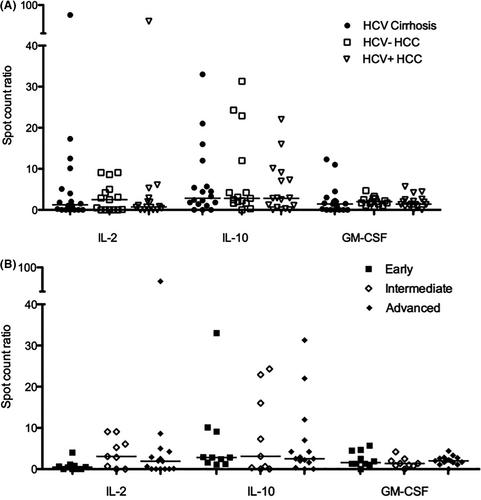T-cell mediated responses against alpha-foetoprotein in hepatocellular carcinoma: Relationship with hepatitis C virus infection, tumour phenotype and patients’ survival
Abstract
Background
Alpha-foetoprotein (AFP) is a potential immunotherapeutic target in hepatocellular carcinoma (HCC). However, T-cell response (TR) to AFP is suppressed in HCC due to immune evasion. It is unknown whether HCV infection may pre-condition TR against AFP, or whether TR may influence the clinical course of HCC.
Methods
We prospectively enrolled 18 HCV+ treatment-naïve patients with cirrhosis (CC), 18 HCV+ HCC cases and 17 HCV- HCC cases. TR was quantified by ELISPOT using assays specific to interleukin (IL) 2, IL10 and granulocyte-monocyte colony stimulating factor (GM-CSF) on ex-vivo peripheral blood mononuclear cells (PBMC) stimulated in vitro with AFP peptides. Cytokine ratios were compared between groups and with clinicopathological features of HCC, including overall survival (OS).
Results
The proportion of AFP-specific responses was not different across the studied groups for any of the assayed cytokines. AFP-specific IL-2 responses were increased in larger (P = .02), multifocal tumours (P = .01) and correlated with advanced disease (P = .01). TRs did not correlate with other clinicopathological factors and did not predict for OS.
Conclusion
Tumour stage but not HCV infection is related to the emergence of anti-AFP TRs. These data enable formulation of a rationale for the further development of anti-AFP immunotherapy in HCC, facilitating optimal patient selection for future studies.


 求助内容:
求助内容: 应助结果提醒方式:
应助结果提醒方式:


